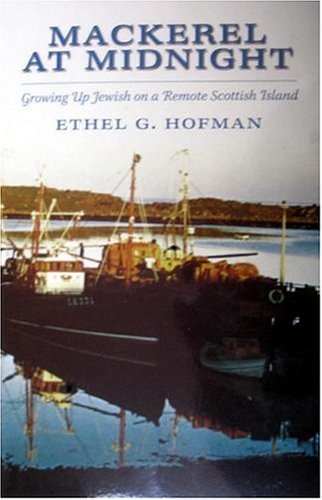Mackerel at Midnight
Reviewed Jul 12, 2017 on The Litt Review.

I saw Mackerel at Midnight in a shelf of Jewish Canadiana books in an upscale, Russian sounding cafe and cocktail bar a few blocks from my apartment in Montréal. The subtitle, “Growing Up Jewish on a Remote Scottish Island”, stuck with me. A good friend of mine, Hamish, is one of the few Jews I knew in Edinburgh, and he goes to the Outer Hebrides every year if he can for a few weeks (although he is from London and bears a thick English accent). I mentioned the book to him the last time I saw him; his immediate reaction was “Why didn’t you buy it?”
I now have. And what’s more, I read the whole thing. Unfortunately, that was mostly a practice in dogged stubbornness. I wanted to be able to mail the thing to my friend when I was done with it, and I couldn’t imagine mailing a book away without having read it.
The book is a memoir, mostly of Ethel Hofman’s mother, Jean Greenwald, a Glaswegian Jewish woman with a penchant for pickling and jamming every vegetable and fruit in sight. Her marriage to Harry, the sole Jew on the island, was arranged before she knew where Shetland properly was. Things go downhill for her, from there. At almost no point is the marriage mentioned as a blessing, and on at least one occasion Ethel almost walks out, leaving the itinerant merchant (and later, shopkeeper) on his own.
The book is clearly, from my perspective, written by the daughter. The dad doesn’t get a good word in edgewise, unless you count his friendliness to his customers. There are some parts where the couple do seem to get on well for a time - for instance, during the war, when hundreds of Jewish Brits were stationed in the Shetlands as part of the Shetland Bus, a famously successful naval effort helping resistance fighters in Scandinavia by doing shuttle runs across the North Sea. The Greenwalds host memorable dinners and a Passover for everyone.
However, it is mostly the mother who shines. Over and over again, Ethel talks about her cooking, her kitchen, and how she tried to put the best face on an otherwise hard life. Ethel makes the effort seem noble and valorous. However, I wish the writing had been a bit tighter - it reads somewhere between a bad journal and a school writing assignment. There’s a glossary of Yiddish and Shetlandic Scots words in the back of the book - I wish I had known before I got there, because there are italicized foreign words throughout the book which I initially took to be patronizing mysteries.
There are two main redeeming qualities to the book. First, anthropologically, I know a lot more about 1930s-1960s Shetland than I ever suspected I would know. There’s tidbits everywhere. One part I particularly liked was the girl’s dresses, described during the War chapters:
Dresses, which had been sewn from the white and cream salvaged from downed parachutes, were clinging and sensuous.
That was a good detail. Another chapter mentions Ethel living on Unst and Yell, two mostly deserted islands in the Shetland archipelago. She mentions a bit of folklore there, and what living on a remote island was like (Lerwick doesn’t sound so bad).
The other salvation for the book was interspersed between the chapters: dozens of recipes, all of them simple. This shouldn’t have been a surprise - Ethel is a professional cook and food journalist, and past president of the International Association of Culinary Professionals. The recipes are very well written. Somewhat inspired, I made two of them while reading the book - Coggly Woggly, which I learned is another name for homemade eggnog, and Kichel, which are absolutely fantastic crisp cookies that take no time or effort at all.
At 175 pages, it was not a long read. While it won’t be winning awards any time soon, I found the whole thing rather enjoyable, in the end. With warm Kichel and eggnog, anyway.
Do you want to get book reviews and notes from books I read in your inbox? Sign up! I'll include a summary, my favorite quotes from the book, and any vocabulary I found interesting or didn't know already.